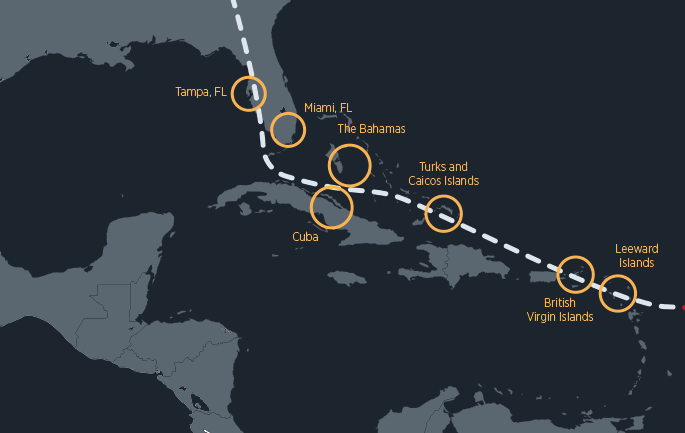In recent years I have written about the impact of global events on location allowances, primarily driven by security-related issues such as the turmoil in Turkey and the heightened terror threat in Europe. We’ve discussed how automatically hiking location allowances may not be an appropriate or necessary response to such incidents. However, over the last few weeks it has been disasters of a less man-made nature making the headlines, with Houston taking a battering from Hurricane Harvey and then Hurricane Irma ploughing through the Caribbean. So how are location allowances likely to be affected?
 Hurricane Irma's path of destruction
Hurricane Irma's path of destruction
The first important issue to point out is that ECA’s Location Ratings System has the potential for natural disasters to occur built into the natural phenomena aspect of the scoring. Various criteria are assessed here – the frequency of natural hazards, the damage they cause, the dangers they pose to expatriates’ lives and standards of living. Some of this assessment is based on historical analysis – locations in the Caribbean will score higher here than, say, western Europe. Therefore, when disaster strikes, these aspects of the scoring will not necessarily change.
Another aspect of the scoring looks at how recently disaster has struck. So, locations which suffered significantly at the hands of Harvey and Irma, such as Houston and St Maarten respectively, will certainly see a score rise when our latest survey results are published in November. All published locations are assessed in the same way and if there has been significant damage and/or loss of life in other locations then their scores may follow suit.
It’s not necessarily just the natural phenomena aspect of the score which will change after a natural disaster. There may be a direct or indirect impact on other aspects of the Location Ratings assessment; for example:
- Goods and Services – owing to supply chain disruption or damage to shops
- External Isolation – runways and airport buildings can be damaged, restricting international flights
- Internal Isolation – damaged roads and communications networks
- Housing and Utilities – uninhabitable housing and disrupted utility services
However, experience suggests that some of these issues are usually resolved relatively quickly once the storm passes (or, in the case of earthquakes, when the aftershocks end). Unless the location affected is very remote, assistance soon arrives and airports and communications networks are quickly brought back online. So, the Location Ratings score in the immediate aftermath of a natural disaster would perhaps be significantly higher than even a week or so later. Therefore, in terms of adjusting location allowances, it’s best to wait and see the true medium-to-long-term impact rather than apply any knee-jerk response. There are practical reasons for this too – the administrative burden of increasing and reducing allowances in the space of a few days or weeks, for example. Additionally, it can be difficult to take away an increased allowance if the assignees on the ground do not consider their situation to have significantly improved.
ECA’s annual Location Ratings update is currently underway and all published locations will be analysed in depth to understand the effects of any incidents over the past year, natural or man-made. Our multi-source approach to research and analysis will allow us to assess the true levels of hardship facing expats in the Caribbean and elsewhere and the impacts of Hurricanes Harvey and Irma will be reflected in the new scores published in November. It’s worth noting here that our scores are location-specific rather than country-specific. Taking the country of Antigua and Barbuda as an example, the town we assess here is the capital, St John’s. The island of Barbuda was devastated but as St John’s is on the island of Antigua, which was relatively unaffected, the score is unlikely to change.
While increased location allowances are not necessarily the appropriate response to disaster, there are other actions that companies with international assignees should take – perhaps the most important being to ensure you have an up-to-date and clear crisis-management plan enabling you to maintain communications with assignees in disaster areas, with clear evacuation procedures in place. This doesn’t just apply to those with assignees in the developing world – as Houston’s recent experience shows, nature can strike even the biggest expatriate hubs. On the other side of the world Hong Kong received a bigger soaking than usual at the hands of Typhoon Hato. Again, the potential for this is already built into the scoring but in neighbouring Macau, the effects of Hato were even more damaging. One thing’s for sure – with forecasters already warning about the imminent impact of Hurricane Maria in the Caribbean, natural disasters will continue to appear alongside man-made ones in the news headlines.
FIND OUT MORE
ECA's Location Ratings are delivered through ECA's Location Allowance Calculator which offers a transparent and detailed system for calculating location allowances for expatriates relocating to a new country. The system recognises that where an employee is coming from as well as going to can affect the level of adaptation required.
Our Consultancy & Advisory service can calculate individual location allowances for you using your chosen home and host locations.
Please contact us to speak to a member of our team directly.